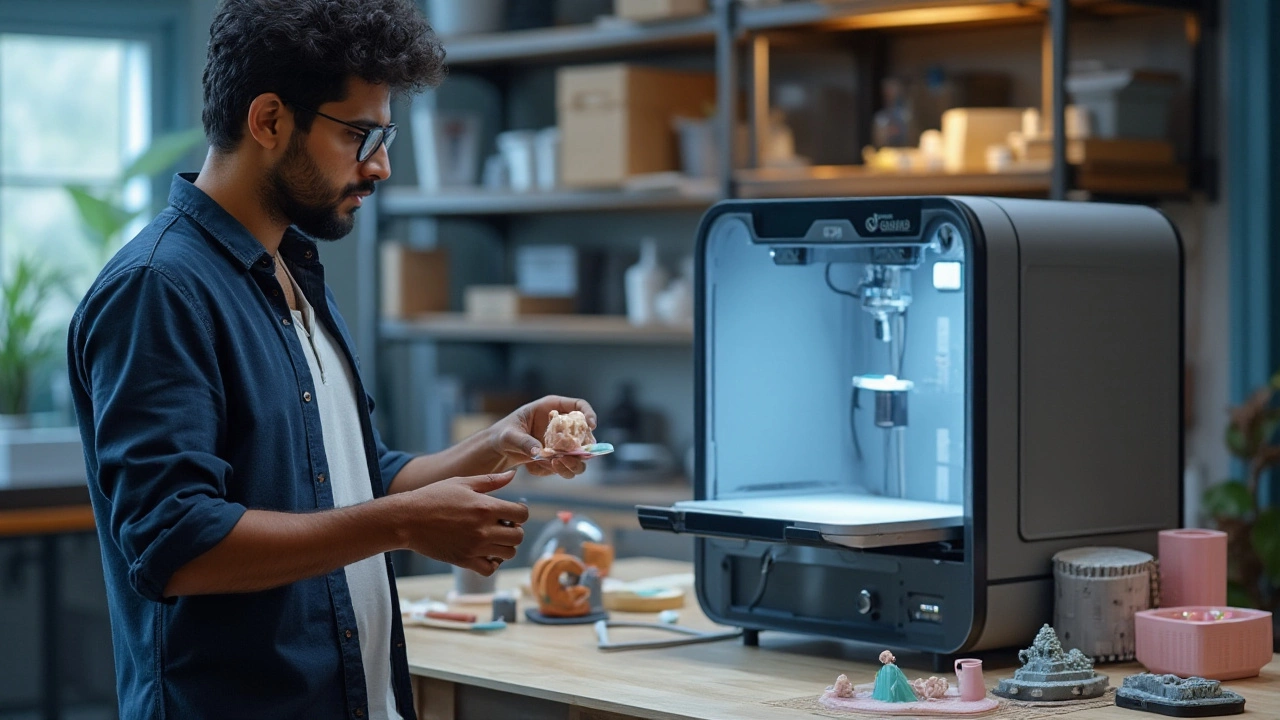
The manufacturing industry undoubtedly carries the heartbeats of many successful economies around the globe. Often referred to as the backbone of industrialization, it promises a plethora of opportunities for entrepreneurs looking to make their mark. With countless segments under its umbrella, from traditional sectors to cutting-edge technological advances, manufacturing continues to hold significant financial allure.
Yet, the burning question for many remains: Is manufacturing truly a lucrative field for business hopefuls? By exploring its scope, growth patterns, and the diverse chances it presents, one can begin to uncover the answer. This article aims to navigate through the complex yet exciting world of manufacturing, serving as a guiding light for potential innovators ready to take on the industry's challenges.
- The Profitable Nature of Manufacturing
- Emerging Trends in Manufacturing
- Startup Ideas with High Potential
- Keys to Success in Manufacturing Ventures
The Profitable Nature of Manufacturing
When you think of the manufacturing industry, envision the relentless hum of machinery working tirelessly to produce everything from everyday essentials to high-tech gadgets. This industry doesn't just make products—it fuels economies. With an impressive contribution to global GDP, manufacturing stands as a beacon for entrepreneurs seeking lucrative opportunities. Part of its profitability stems from its sheer scope; covering fields like automotive, electronics, textiles, and new-age startups focusing on sustainable production, the industry presents myriad pathways for revenue generation. Investing in manufacturing often promises high returns, especially when done strategically by tapping into new technologies and evolving market demands.
The demand for manufactured goods remains high, consistently aged by consumer needs and technological advances. As the world continues to urbanize and populations grow, the need for manufactured items—from the mundane like packaging and furniture to the highly specialized like medical devices and renewable energy components—only increases. However, profitability in manufacturing is not just about producing goods cheaply yet efficiently. It’s about innovation, adapting to changes, and improving quality while reducing costs. While that might seem like a tall order, those who dare to innovate often find themselves at the cutting edge of the economic ladder. An interesting fact: the manufacturing sector is responsible for about 16% of the world’s GDP, underlining its weighty impact on global wealth.
Amidst all these statistical wonders, one can’t ignore the personal stories that sprinkle the industry with a dash of inspiration. Many successful companies we recognize today, like Tesla or Samsung, began their journey on the manufacturing floors. "The power of manufacturing lies not just in what it creates but in the platforms it builds for economies," states Elon Musk during a keynote event. Such narratives fuel the belief that with the right idea and execution, manufacturing can indeed be a goldmine. For any startup, identifying a niche or an underserved market need, coupled with innovative solutions, sets the pace for lucrative endeavors.
Looking deeper, there's a growing trend towards smart manufacturing. This involves integrating technologies like IoT (Internet of Things), AI, and automation within the manufacturing workflow. These advancements not only enhance efficiency but also ensure sustainability and eco-friendliness, thus aligning with contemporary consumer values. Leveraging these technologies allows new players to enter the market with less overhead, as automation can minimize the need for a large workforce, cutting costs dramatically. In turn, this results in higher profit margins, especially when products resonate with current ecological and societal trends.
Consider also the influence of global trade networks which open up even more opportunities for financial growth. By exploring both local and international markets, manufacturers can tap into varying price dynamics and consumer preferences. This global orientation doesn't just augment potential sales; it insulates businesses against regional economic downturns, making manufacturing a stable and sound venture. However, it's also essential to keep in mind the challenges—such as regulatory compliance and supply chain uncertainties—that can affect profitability if not adequately planned for. Strategic planning, adaptability, and continuous market analysis remain critical for enduring success in the manufacturing domain.

Emerging Trends in Manufacturing
The manufacturing landscape is shifting dramatically, as innovation drives the sector into new directions filled with potential. Central to this evolution is the rise of Industry 4.0, which represents a smart shift towards automation and digitalization across the manufacturing sector. Technologies such as the Internet of Things (IoT), big data analytics, and artificial intelligence (AI) are intertwining with traditional processes, creating networks of intelligent devices that communicate autonomously. This connectivity not only enhances efficiency but also opens up pathways for small manufacturers and startups to play significant roles in global supply chains.
One cannot ignore the impact of 3D printing, which is revolutionizing the way products are designed and manufactured. What began as a tool for prototyping is now paving the way for customized mass production. This trend underlines an essential shift towards a more personalized manufacturing approach where consumers increasingly demand products tailored to their exact specifications. Such innovations allow for a level of flexibility that once seemed impossible, calling into question long-established business models founded on economies of scale. According to a report, "Additive manufacturing will be a game-changer in how we approach product development," remarked a leading expert in the field.
Additionally, sustainable manufacturing is gaining momentum, driven by increasing environmental concerns and regulatory pressures. Businesses are progressively adopting eco-friendly practices aimed at minimizing waste and conserving resources. Renewable energy sources are becoming integral to factory operations, and circular economy principles are being incorporated, stressing the importance of recycling and remanufacturing. This sustainable focus not only garners favor with eco-conscious consumers but also often results in cost savings, as it aligns with global initiatives targeting a reduction in carbon footprints. A vivid example of this trend is the automobile industry’s shift towards producing electric vehicles, reflecting a broader commitment to sustainability.
The future of manufacturing also promises to be highly collaborative, leveraging crowd-based innovation platforms where ideas and solutions are sourced from a global pool of contributors. This blurring of traditional company boundaries through collaboration allows small businesses and startups to engage with innovation ecosystems that were previously out of reach. Such collaborative approaches are proving instrumental in rapidly tackling complex challenges and capturing new growth opportunities. The agility afforded by these networks is vital in today's fast-paced markets, where getting ahead is as much about forging the right partnerships as it is about internal capabilities.
The trends succinctly demonstrate the vibrant and ever-evolving nature of the manufacturing industry. As startups and established companies adapt to these changes, those who effectively harness these waves of innovation stand poised to reap substantial rewards. The key is to remain informed, agile, and committed to integrating forward-thinking strategies. By embracing these trends, manufacturers can not only secure their present status but also ensure a dominant position in the industry’s future landscape.

Startup Ideas with High Potential
Venturing into the manufacturing industry comes with a myriad of startup possibilities that could yield substantial profits. One burgeoning area is sustainable product manufacturing. With the world moving increasingly towards eco-friendly solutions, creating products that reduce environmental impact is not only lucrative but aligns with global trends. Producing biodegradable packaging materials, reusable household goods, or energy-efficient appliances can tap into the vast market of conscientious consumers. As regulatory bodies across continents push for greener solutions, aligning your business with these goals can provide a competitive edge and ensure compliance with new standards.
Another viable startup idea resides in the realm of personalized manufacturing. The rise of digital technology and consumer demand for bespoke products have paved the way for custom solutions. Companies that offer personalized, made-to-order items—like custom furniture, tailored clothing, or one-of-a-kind gadgets—can capture niche markets dedicated to individuality and uniqueness. Utilizing advancements in 3D printing technology, startups can provide cost-effective custom solutions previously impossible due to size or budget constraints. This not only attracts a loyal customer base but also promotes innovation in an increasingly standardized world.
The electronics manufacturing industry continues to boom with the ongoing demand for smart devices and IoT (Internet of Things) technology. Entrepreneurs can look into creating components or devices that enhance connectivity, automation, and smart home integration. With the tech-savvy consumer base expanding rapidly, opportunities abound in developing products that add convenience and intelligence to everyday tasks. Rolf Baxter, an industry expert, emphasizes,
"The persistent evolution in smart technology provides an unprecedented opportunity for new manufacturers to set benchmarks in innovation and user experience."Introducing groundbreaking designs and solutions can cement a startup’s place as a leader in the electronics sector.
Another area worth exploring is food manufacturing with a focus on health and wellness. The increasing awareness of dietary habits and lifestyle choices has driven the demand for organic, plant-based, and allergen-free products. Startups can thrive by catering to specific dietary needs and preferences, offering innovative alternatives to traditional food products. As consumers become more health-conscious, the potential for profits in this segment grows exponentially. Providing transparency in sourcing and production processes can further build trust with your audience, setting the foundation for long-term success.
Capitalizing on Trends
Keeping abreast with market trends is critical in identifying high-potential startup ideas within the manufacturing sector. An informed approach not only ensures that you meet market demands but also helps in predicting future needs. With digital supply chains and advanced analytics, leveraging data to gain insights into consumer behavior becomes essential for sustained growth. Recognizing shifts and adapting accordingly can differentiate your startup in a crowded marketplace. By combining innovation with pragmatism, new entrants in the manufacturing industry can unlock lucrative pathways and drive transformative impact.

Keys to Success in Manufacturing Ventures
Navigating the realm of manufacturing requires a fine balance between innovation, efficiency, and responsiveness to market trends. Successful ventures invariably prioritize a few foundational pillars that drive their growth and sustainability. One of these is the embrace of technology. By integrating state-of-the-art automation and data analytics, businesses can greatly enhance their production efficiency. Automation allows for scaling up operations with minimal error and waste, leading to both cost savings and higher profit margins, reinforcing the notion of a lucrative industry.
Another fundamental key to success is maintaining a solid supply chain management. A robust supply chain facilitates seamless operations from raw material acquisition to finished product delivery. Building strong relationships with suppliers ensures a steady flow of materials, which is crucial during times of global disruptions. Transparent and responsive supply chain practices not only avert potential setbacks but also enhance credibility with partners and clients alike.
"In today's competitive market, aligning supply chain operations with business strategy is a critical step to ensure long-term success," said Michael L. Manyak, a prominent figure in global logistics.
Additionally, focusing on sustainability can not only open up new market opportunities but also cater to shifting consumer preferences. Embracing eco-friendly practices not only reduces a company's environmental footprint but could also lead to cost-effective solutions in the long run. This is particularly pertinent given the increasing demand for sustainable products, which can set a brand apart in a crowded market.
Another crucial aspect is fostering a skilled workforce. In the manufacturing sector, where precision is often non-negotiable, having a team that is continuously trained and motivated can prove invaluable. Investing in workforce development ensures that employees are well-equipped with both the technical skills and the innovative mindset necessary to tackle evolving challenges.
Finally, developing a customer-centric approach can greatly enhance the profitability of manufacturing ventures. Understanding and meeting customer demands with speed and accuracy builds brand loyalty and generates repeat business. Utilizing customer feedback to continually improve products and services creates a positive cycle of growth and customer satisfaction. Many successful manufacturing firms have established dedicated teams to handle customer interactions and feedback, ensuring the business remains adaptable and responsive to market needs.
In essence, achieving success in manufacturing involves a commitment to technological innovation, supply chain agility, sustainability, skillful workforce management, and a customer-oriented strategy. Combining these elements can set the foundation for a prosperous journey in this lucrative industry, making it a worthwhile pursuit for any ambitious entrepreneur.




